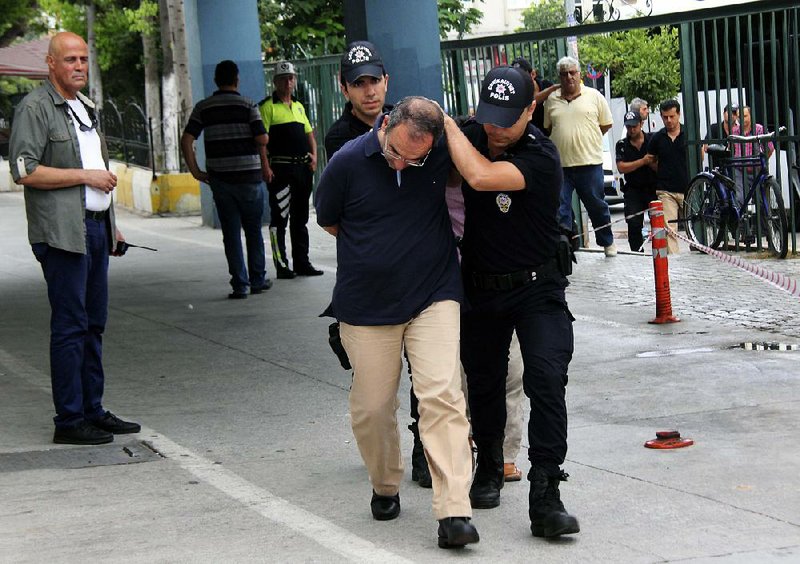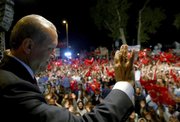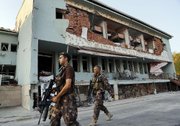ISTANBUL -- Asserting that "all the evidence" points to a U.S.-based Muslim cleric as the mastermind of last week's failed coup, Turkey's government Tuesday fired tens of thousands of teachers, university deans and others accused of ties to the plot and demanded the cleric's extradition.
Turkish President Recep Tayyip Erdogan raised the issue in a phone call with President Barack Obama. Erdogan's spokesman, Ibrahim Kalin, said the government was preparing a formal extradition request for the cleric, Fethullah Gulen.
"A person of this kind can easily be extradited on grounds of suspicion," Kalin said. "And there is very strong suspicion for his involvement, for Gulen's involvement, in this coup attempt. So this is sufficient ground."
White House spokesman Josh Earnest said Turkey had submitted materials related to Gulen and that the administration was reviewing them to determine whether they amounted to a formal extradition request. Earnest added that a decision on whether to extradite would be made under a longstanding treaty between the two countries and wouldn't be made by Obama.
Obama, speaking with Erdogan by phone Tuesday, pledged "any needed assistance to the Turkish government," Earnest told reporters in Washington, adding that Obama made clear that the U.S. expects that any inquiry should be conducted "consistent with the democratic" values of the Turkish constitution.
"There is a process that we will follow" as it relates to Gulen, Earnest said. "There also is due process to which people who live in the United States are entitled. And we'll make sure that that due process is followed as well."
The Obama administration will refer the matter to the Justice Department, which will review the documents to determine whether the Turkish government has established probable cause that a crime was committed. Gulen has denied any knowledge of "the horrific failed coup."
Thousands fired
The crackdown involved the firing of nearly 24,000 teachers and Interior Ministry employees and demanded the resignations of another 1,577 university deans.
The dismissals touched every aspect of government life.
Turkish media, in rapid-fire reports, said the Education Ministry had fired 15,200 educators, the Interior Ministry dismissed 8,777 employees and Turkey's Board of Higher Education called for the deans' resignations. In addition, 1,500 finance ministry employees were fired, 257 people working at the prime minister's office were fired, and 492 staff members at the Directorate of Religious Affairs were dismissed, including clerics, preachers and religious teachers.
Tuesday's firings come on top of the purging or detention of nearly 35,000 members of the military, security forces and judiciary. Turkey's state-run Anadolu news agency says courts have ordered 85 generals and admirals jailed pending trial over their roles in the coup attempt. Dozens of others were still being questioned.
The military has about 620,000 members, and the police force has about 250,000.
Prime Minister Binali Yildirim likened Gulen's followers to a "parallel terrorist organization."
"We will dig them up by their roots so that no clandestine terrorist organization will have the nerve to betray our blessed people again," Yildirim told parliament Tuesday.
Asked about the scale of the purges, U.S. State Department spokesman Mark Toner cautioned Turkish authorities not to overreach.
"The types of arrests and roundups that you cite have not gone unnoticed by us," he said.
The latest purges were intended to blunt the influence of Gulen, an Erdogan rival who has been in self-imposed exile in Pennsylvania since the late 1999 and whom the government has long accused of being behind a "parallel terrorist organization." They follow earlier moves by Erdogan's administration against Gulen loyalists in the government, police and judiciary after corruption probes targeted Erdogan associates and family members in late 2013 -- prosecutions the government says were orchestrated by Gulen.
"No democracy shall allow for soldiers, prosecutors, police, judges and bureaucrats to take orders from an outside organization instead of the institutional bureaucracy," Erdogan said in accusing Gulen of involvement in the coup.
Gulen has inspired an international network of schools, including more than 160 public charter schools in the United States, which have won grants from the federal government. But Gulen's movement has said it has no direct ties to these schools, and he has denied involvement in the coup.
Western diplomats have criticized Turkey for the sweeping expulsions and arrests since the attempted coup, urging Erdogan's government to remain committed to democratic principles including respect for human rights and for the rule of law.
Turkish officials say their response is appropriate considering that the plotters have been accused of trying to kill or capture the president.
"It took several thousand soldiers to carry out this coup attempt," Kalin, the president's spokesman, said Tuesday.
"We have seen many of them on the streets and there are those that hijacked helicopters and F-16s. Many of those shot at innocent people and blocked the roads."
"Then there were the generals that planned the coup and declared martial law," he continued. "It is only natural that we apply the rule of law to arrest these people on charges of treason and trying to change the constitutional order of the country illegally."
Tour of buildings
The Turkish leader, meanwhile, made a series of televised appearances in which he disclosed details of his survival on the night of the failed coup.
He told U.S. broadcaster CNN that he narrowly escaped death after coup plotters stormed the resort town of Marmaris where he was vacationing.
"Had I stayed 10, 15 additional minutes, I would have been killed or I would have been taken," he said in the interview late Monday.
Erdogan and other officials have said the government is considering reinstating the death penalty, a practice abolished in 2004 as part of Turkey's bid to join the European Union.
Several European officials have said such a move would be the end of Turkey's attempts to join the bloc.
Addressing hundreds of supporters outside his Istanbul residence early Tuesday, Erdogan responded to calls for the reintroduction of the death penalty with the simple statement: "You cannot put aside the people's demands."
"In a country where our youths are killed with tanks and bombs, if we stay silent, as political people we will be held responsible in the afterlife," Erdogan said, pointing out that capital punishment exists around the world, including in the United States and China.
The violence surrounding the Friday night coup attempt claimed the lives of 210 government supporters and 24 coup plotters, according to the government.
On Tuesday, foreign media were taken on a tour of government buildings that were targeted by F-16 airstrikes, including the headquarters of the Turkish special forces police where 47 officers were killed. The explosions damaged the roof of one of the buildings and tore down its front wall, exposing dust-covered bunk beds. A second building was riddled with bullet fire from helicopters, while a charred X-ray machine could be seen inside the wrecked security clearing area at the entrance of the complex.
Esra Kokcu, accompanied by relatives, was visiting the site where her cousin, Selmani Terzi, was severely wounded and lost a leg in the attack. She took out her smartphone to show reporters pictures of Terzi in his hospital bed.
"These people are not human," she said of the coup plotters.
Yildirim, meanwhile, lashed out at Europe, whose leaders have expressed concerns over the purges underway across Turkey's key state institutions.
"We thank our European friends for their support against the coup, however their sentences starting with 'but' did not please us at all," he said.
Regarding Turkey's demand that Gulen be extradited, Yildirim compared the situation to the U.S. hunt for Osama bin Laden after the Sept. 11, 2001, terror attacks.
"We will present them more proof than they'll know what to do with," he said. "I want to ask our friends in the U.S., did you ask for proof when you demanded the terrorists after the Twin Towers fell on Sept. 11? When you didn't bother looking for proof for bin Laden, why are you demanding evidence for Fetullah Gulen when the evidence is clear as day? You should give up defending that terrorist leader."
Constitution changes
Government officials are expected to propose changes in the country's constitution that will give Erdogan's government more control over the Turkish armed forces, according to Turkish officials.
A Turkish government official, who spoke on condition of anonymity because the announcement has yet to be made public, said an outline of the military restructuring could be proposed as early as today when the Turkish National Security Council is expected to meet.
"It would be a radical decision for defense-related issues," the official said.
Mevlut Cavusoglu, Turkey's foreign minister, confirmed in an interview Tuesday that the issue of civilian oversight of the military would be addressed during the series of meetings today.
Erdogan is expected to attend the National Security Council meeting and has said he will make an "important" announcement alongside the Council of Ministers afterward, though he would not go into specifics, according to local news reports.
The Turkish military has served as a somewhat independent entity within the government, viewing itself as a defender of the Turkish Constitution in the event that any one leader or party threatened the values set forth by the country's founder, Mustafa Kemal Ataturk.
And since the 1960s, the military has been responsible for a series of coups in the country.
But in recent years, as Turkey has bid to enter the European Union, the military has been subject to more civilian oversight.
Despite the changes, however, the chief of staff still outranks the minister of defense and the military largely controls its own budget, with little civilian oversight.
Any revisions will probably change that, the Turkish government official said, bringing the chief of staff under the minister of defense and enacting changes that will give parliament more oversight over the military's budget and its ranks.
"When we go to the NATO ministerial meetings, the chief of the general staff is sitting in the front and the minister of defense is behind," Cavusoglu said. "In no other NATO ally can you see this picture."
Information for this article was contributed by Dominique Soguel, Suzan Fraser, Sarah El Deeb, Cinar Kiper, Desmond Butler and Eric Tucker of The Associated Press; by Ceylan Yeginsu of The New York Times; by Thomas Gibbons-Neff and Souad Mekhennet of The Washington Post; and by Angela Greiling Keane, Toluse Olorunnipa, Onur Ant, Taylan Bilgic and Constantine Courcoulas of Bloomberg News.
A Section on 07/20/2016


